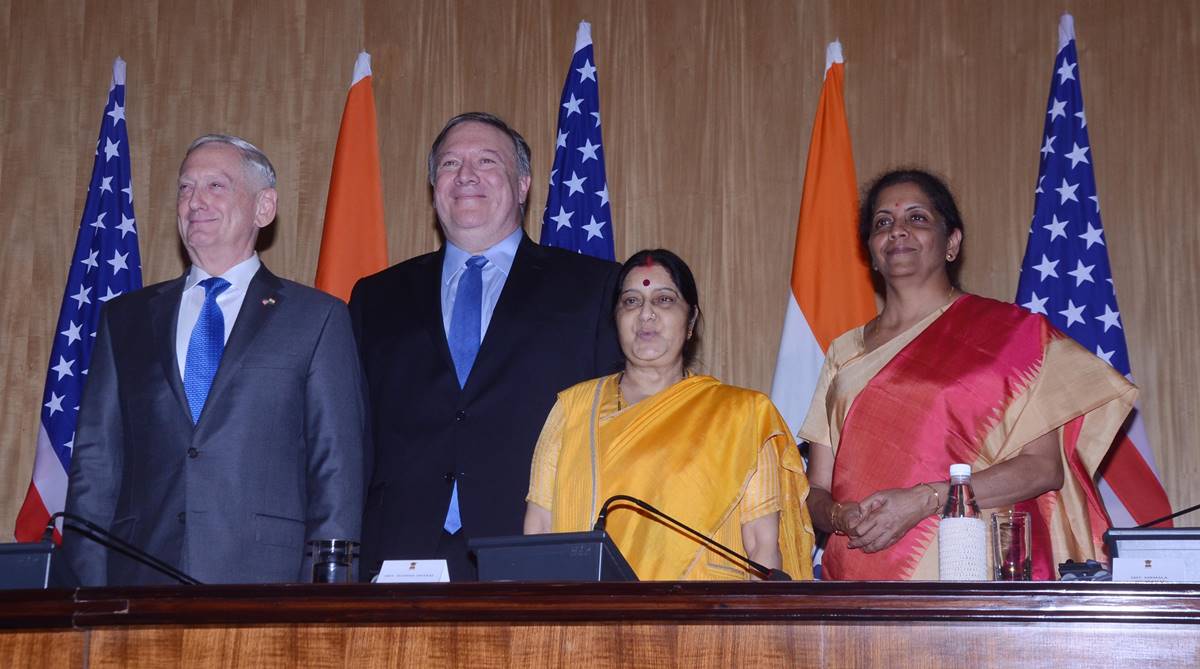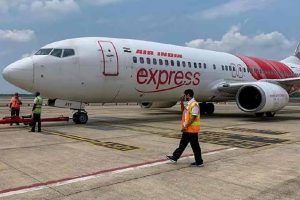After the cancellation of US-India 2+2 Dialogue twice in the last 14 months, the external affairs minister, Sushma Swaraj, and Defence minister Nirmala Sitharaman held the first highlevel 2+2 talks on September 6 with their US counterparts, Mike Pompeo and Jim Mattis. The objective was to boost cooperation in the Indo-Pacific region and finalise a pact on encrypted high defence technologies. Chairman of the US Joint Chiefs of Staff General Joseph Dunford was also part of the US delegation. India should have also included its Chairman of the Chiefs of Staff Committee, Admiral Sunil Lanba.
India and the US pledged to expand their bilateral trade and economic partnership with a view to promoting investment and job creation. According to a joint statement issued after the inaugural India-US Ministerial 2+2 Dialogue, the two nations agreed to work collectively with other partner countries in the Indo-Pacific region to support transparent, responsible and sustainable debt financing practices in infrastructure development.
Calling for a free and open Indo-Pacific, Mike Pompeo said that both India and the US should continue to ensure the freedom of the seas and the skies. Pompeo stressed the need to uphold a peaceful resolution of territorial maritime disputes, promoting market-based economies, supporting good governance, fundamental rights, and liberties, and preventing external economic coercion.
Jim Mattis said, “India’s leadership in the world supports our shared democratic values regionally and globally. We also recognise the increasing connectivity between the Indian and Pacific Oceans, renaming the US Pacific Command as the US Indo-Pacific Command. With India as a major defence partner, we are elevating our defence relationship to be on par with our closest allies as we deepen the broader US-India relationship, enhancing our inter-operability, our defence trade, our technology innovation, industrial collaboration and bolstering our people-to-people bonds”.
Mike Pompeo and Jim Mattis praised the deepening ties between the world’s two largest democracies after their first joint meeting with their Indian counterparts in New Delhi. “The relationship between the United States and India has entered “a new era,” Pompeo said, adding that 6th September meeting is “symbolic of our increasingly close partnership.”
India seeks US partnership to boost various sectors and expand the bilateral trade to $500-$600 billion from the current $125 billon with a good strategy under a stipulated timeframe, commerce and industry minister Suresh Prabhu said.
The major takeaways were the signing of the longpending Communications Compatibility and Security Agreement (COMCASA) and setting up of a hotline between the External Affairs Minister and Defence Minister with their American counterparts. This will enable India access to advanced technologies from the US. COMCASA will provide a legal framework for the transfer of communication security equipment from the US to India that would facilitate “interoperability” between their forces and potentially with other militaries that use US-origin systems for secured data links. It will also allow the installation of highsecurity US communication equipment on defence platforms being sourced from the US.
The S-400 air defence systems that India is purchasing from Russia and import of oil from Iran have been two major points of contention in the 2+2 dialogue. The United States has agreed to engage India and explore a mutually agreeable solution on the issue of purchase of Iranian oil despite its deadline of November 4 for countries to halt imports and ban purchase of defence equipment from other countries.
India is hopeful that it will be excluded from US sanctions over the purchase of S-400 antiaircraft missile defence systems from Russia, though this issue was not discussed at 2+2 dialogue. However, Pompeo said, “the US would work with India on the two issues being a great strategic partner”.
The Indian side maintained that “it would not be a viable proposition for India to reduce the oil imports from Iran to zero. The US understands our concerns and both sides will continue with the discussions on the issue”. India is the biggest buyer of oil from Iran after China, and it is seeking a waiver from the US. Iran is a key partner for India and the two countries are engaged in the development of the strategically significant Chabahar port, which would give land-locked Afghanistan access to the sea, bypassing Pakistan.
On the H-1B visa issue, Ms Swaraj is hopeful that the US would not “act against” the interest of Indians. “This visa impacts Indian IT professionals. We have appealed to the US to keep this a high-priority in our ties,” she said. Both sides also agreed to work together towards the entry of India to the Nuclear Suppliers Group (NSG). In January, the Donald Trump administration had endorsed India’s quest for membership into the exclusive club but New Delhi has faced impediments from Beijing, which has insisted that India was not a signatory to the Non-Proliferation Treaty (NPT).
The meeting also focused on regional stability in South Asia, South-east Asia and the Indo-Pacific, where the US is seeking to counter-balance China’s growing military assertiveness in the region. In a message to China, Pompeo said, “We should continue to ensure freedom of the seas, skies, uphold the peaceful resolutions of the maritime disputes, promote market-based economics and good governance and prevent external economic coercion.”
In their joint statement, the ministers called on Pakistan to ensure that their territory was not used to launch terrorist attacks on other countries. “We have discussed terror emanating from Pakistan and have agreed that Pakistan needs to do a lot more to curb terror originating from it,” Ms Swaraj said. Welcoming the recent US move to designate three Pakistan-based Lashkar-e-Toiba (LeT) terrorists and sponsors of terror as Specially Designated Global Terrorists (SDGT), she said, “This listing is based on terrorism that is flourishing in Pakistan, which has equally affected India, the US and the world.”
The two sides also pledged support to an Afghan-led, Afghanowned peace and reconciliation process. “We welcome President Trump’s policy on Afghanistan. We are working together in the fight against terror,” she said.
“This meeting is a reflection of our tremendous focus on developing our ties over the past few years. The commencement of first-ever of 2+2 conference between India and US is a concrete manifestation of the vision of our leaders ~ Prime Minister Modi and US President Donald Trump to take India-US relationship to an even higher trajectory,” said Defence Minister Nirmala Sitharaman.
India has to remain firm in protecting its rights to purchase the best defence equipment from any country especially Russia and import oil from Iran as per its requirement without coming under pressure of US sanctions in future talks.
The writer, a retired Professor of International Trade, is author of World Trade Organisation: Implications for Selected Sectors of Indian Economy. He may be reached at vasu022@gmail.com











